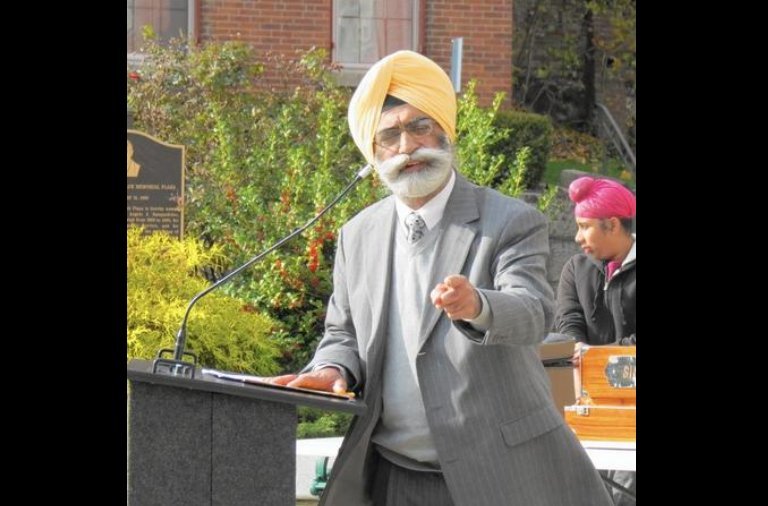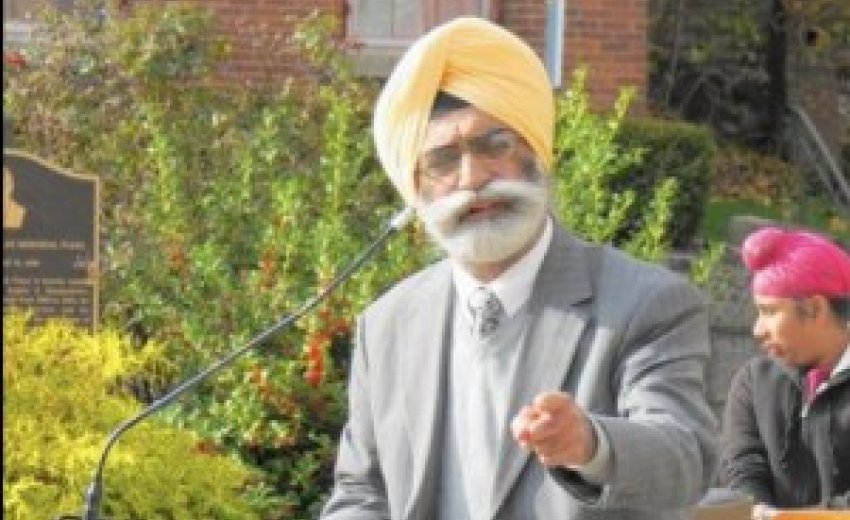 |
| Mammohan Singh Bharara of the Hamden Sikh community calls listeners to remember the 1984 Sikh massacre and to work for justice. Photo by Janice Steinhagen. |
|
Sikhs from across Connecticut gather in Norwich to mark the anniversary of the 1984 genocide in Punjab.
The event featured speeches, prayer, music and a solemn tolling of the Freedom Bell in City Hall's David Ruggles Freedom Courtyard in memory of those killed in the attacks. Norwich Sikh community leader Swaranjit Singh Khalsa, who spearheaded the event along with the Norwich Area Clergy Association and the Sikh Sewak Society International, also tolled the bell for President John F. Kennedy, assassinated on Nov. 22, 1963, who he said was an advocate for justice for all people. "Whatever has been done in the past, we cannot change it," he said. "It's part of history now." He said he hoped that Norwich and other communities across the country would follow the lead of the Harvey, Ill. city council, which earlier this month passed a resolution declaring the 1984 anti-Sikh violence as genocide. "We want to educate our fellow Americans and our own people," he said. "It's been 30 years and there' s still no closure." In June of 1984, the Sikh faith's most holy shrine, the Darbar Sahib, also known as the Golden Temple, in Amritsar, Punjab, was attacked by Indian-government-sponsored forces, who suspected that weapons were being stockpiled there. Hundreds of Sikh worshippers at the shrine were murdered and the structure was desecrated and burned, said Swaranjit. Indian Prime Minister Indira Gandhi, who ordered the attack, was subsequently assassinated by two of her Sikh bodyguards, sparking days of wholesale slaughter of Sikhs across India that have been compared to the anti-Jewish pogroms in imperial Russia or to Kristalnacht in Nazi Germany. Some estimates place the death toll throughout the nation at 11,000. "Sadly, to me it feels like yesterday. My three cousins were burnt alive in front of their mothers and wives, who were raped and tortured," said Pritpal Singh of New York, who survived the massacre. "No one came to help." Government and police officials provided the expensive kerosene used to burn the homes of Sikhs, often with their residents inside, he said. "The guilty have not been punished. They've been hiding in plain sight, and been rewarded for their actions," he said. Pritpal said that Sikh teaching regards the one God as god of all humanity. "This is not a Sikh issue. It's the issue of all of us. It could be happening to any of us," he said. He urged all people to "look at each other and see sister, brother, child, father. There are multiple paths, but we're one family. If you haven't found the human way, you're still lost." Alongside Sikhs attired in traditional turbans and headscarves stood officials from city and state government, including Norwich Mayor Deb Hinchey and State Sen. Cathy Osten (D-19). Speeches by Jacqueline Owen, president of the Norwich chapter of the NAACP, and Rev. Nicholas Dellerman, pastor of St. Nicholas Orthodox Church and president of the NACA, attested to the sympathy and support of Norwich residents across a wide spectrum of faith and ethnicity. Owen said her research into the Sikh belief system "really touched my heart", with its teaching of equality across races, genders and class. With their shared history of suffering from prejudice, "African-Americans, I know, can identify with the feelings of the Sikh community," she said. "The beheadings of American by ISIS really brings it home: there is a need for understanding and respect between cultures." City Historian Dale Plummer made his appearance in a traditional Sikh turban, the garment worn by Sikh men to cover their hair, which is never cut. He recalled the legacy of America's Civil War in the attempt to fight "the injustices of racism and intolerance, which continue to this day." Hinchey presented Swaranjit with a city proclamation citing November 2014 as Sikh Awareness Month in Norwich. "We are so proud to have you as members of our community. We are a community that welcomes all," she said. Swaranjit asked that the members of the Sikh community gather round as he received the proclamation. "This is too heavy for me alone," he said. Copyright © 2014, Hartford Courant |
